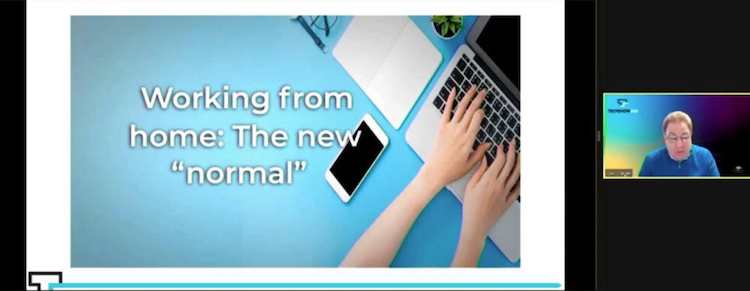Working at home when everyone is home could pose confidentiality risks

At the ABA Techshow 2021 on Monday, Pennsylvania lawyer Daniel J. Siegel spoke about working remotely during the COVID-19 pandemic.
As lawyers work from home during the COVID-19 pandemic, family members as well as virtual assistants like Amazon Alexa might hear confidential client conversations they shouldn’t, according to Pennsylvania lawyer Daniel J. Siegel, who for the past year has done much of his work at the kitchen table.
“Working remotely, there’s the potential for eavesdropping from nosy family members,” he said at an ABA Techshow presentation on Monday titled “Ethics of Remote Practice.”
A small firm attorney who handles workers’ compensation, personal injury and Social Security disability claims, Siegel lives with his son, who spent most of the pandemic working, and his wife, who would go to an upstairs room during his client calls.
“She couldn’t hear me, so that was fine,” says Siegel, who serves on the council of the ABA Law Practice Division and chairs the Pennsylvania Bar Association’s committee on legal ethics and professional responsibility.
Besides avoiding client conversations in home spaces where family members can hear them and limiting or prohibiting the use of virtual assistants, Siegel suggested lawyers working remotely encrypt information sent by electronic mail; keep computer operating systems updated to avoid cyber attacks; and they do their work on a VPN (virtual private network) along with two-factor authentication. He also advised having a firmwide policy on what is required for working from home and making sure all employees understand it.
Follow along with the ABA Journal’s coverage of the ABA Techshow 2021 here.
Additionally, his presentation addressed the question of working from home when home is in a state where one is not licensed to practice law. In December, the ABA Standing Committee on Ethics and Professional Responsibility released Formal Opinion 495, which explains that attorneys can work remotely in states where they don’t have law licenses, providing they don’t hold themselves out as being licensed to practice there or advertise that they are licensed to practice there.
Siegel said the issue of working remotely in a different state was one of the most common questions asked during the pandemic. In March, the Pennsylvania Bar Association’s committee on legal ethics and professional responsibility in conjunction with the Philadelphia Bar Association’s professional guidance committee issued a joint formal opinion adopting Formal Opinion 495.
Write a letter to the editor, share a story tip or update, or report an error.


